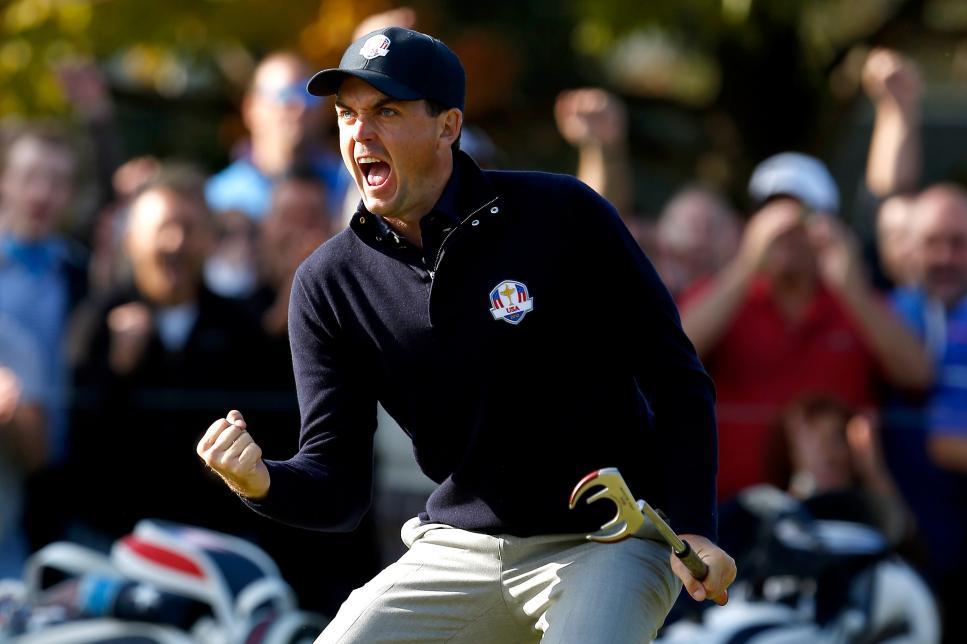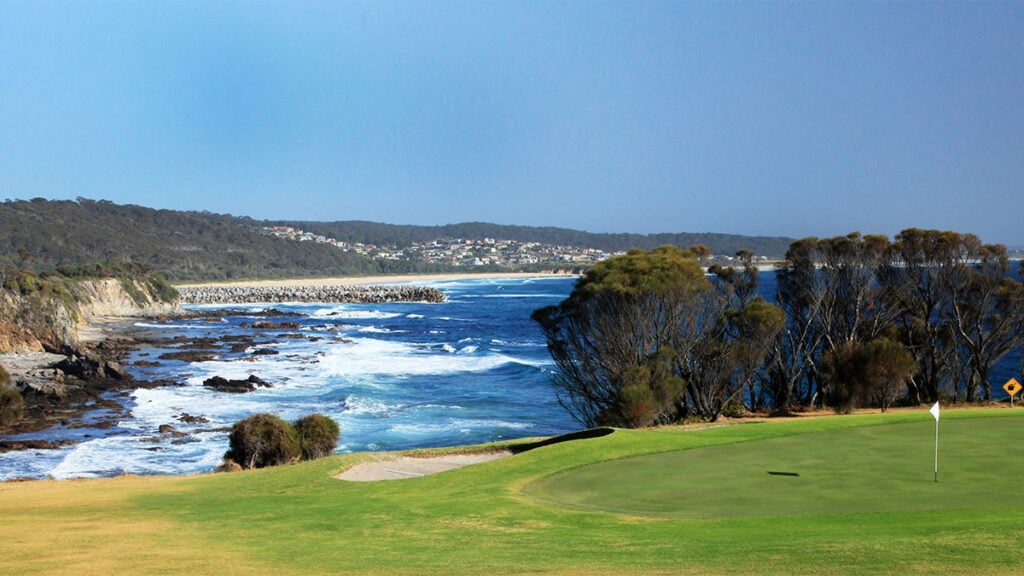[Picture: Andrew Redington]
What appeared to be a dream scenario for the European Ryder Cup team has turned into its worst nightmare.
RYDER CUP: Ryder Cup 2025: Keegan Bradley explains why he didn’t pick himself for US team
For the past year, European players and officials have barely contained their glee, openly crowing that their American counterparts had committed an unforced error of historic proportions. By naming Keegan Bradley—undeniably one of the world’s 15 best players—as captain, the Americans had supposedly laid the groundwork for both a distracted leader and, should be pick himself for the US team, a player operating well below his capabilities. The smugness has been relentless and pervasive. In hushed conversations during tournament weeks, over elaborate dinners and late-night drinks, through carefully crafted needling text messages—the conviction ran so deep and true that they made their schadenfreude publicly known.
OTHER NEWS: Australian Open winner to add Masters invitation to Open Championship start
This week, in a venerable Old World publication that erroneously predicted Bradley would select himself for the team, former Ryder Cup captain Sam Torrance declared such a move would represent “the worst decision ever made in Ryder Cup history.” Nick Faldo, never one to mince words, piled on: “I told Keegan to his face he shouldn’t do it, but over here we must hope he does.” Even Rory McIlroy, the beating heart and philosophical soul of European golf, has remained steadfast that the demands of modern captaincy would compromise any player’s ability to perform at the highest level, a belief that runs so deep that McIlroy turned down the opportunity to captain in 2027.
To understand their assertions we first acknowledge what they have masterfully constructed over decades: a culture laser-focused on the Ryder Cup, where the communal experience serves as the bedrock of their identity. Their players embrace a philosophy of self-sacrifice—competing not for themselves but for each other, their countries, the crowds that roar behind them. This ethos doesn’t fully explain why journeymen players transform into legends every two years, or why Europe hasn’t lost at home in three decades, or why they consistently triumph as underdogs. After all, if team unity were everything, they wouldn’t have lost three of their last four road matches. But it remains the singular factor that defines their Ryder Cup DNA—an aspirational standard that American fans desperately wished their own players would embrace.
The Americans, by contrast, have wrestled with perceptions of self-centredness, most recently in Rome where questions about player compensation created an unwelcome distraction. While Patrick Cantlay’s defiant Saturday afternoon performance against a hostile gallery ranks among the most stirring displays in recent Ryder Cup memory, Sunday’s aftermath proved more telling. When roughly half the American team decided not to wear hats in solidarity with Cantlay and half still did, they revealed that even in resistance, they remained fractured.
Conversely, the Europeans have cultivated an almost insufferable air of Ryder Cup superiority. They fancy themselves the event’s ultimate authorities, conveniently ignoring that the competition has become competitively stagnant—what other sporting event sees the home team win eight of the last nine editions, most in blowout fashion? Much of their recent smugness stemmed from the ironclad belief that Bradley selecting himself was inevitable. This became gospel in European circles, but it was also calculated gamesmanship that would make Seve Ballesteros proud. Frankly, the European crowing about the impossible bind Bradley and the Americans had created for themselves was becoming genuinely nauseating.
But now? The Europeans have inadvertently provided the Americans with the very glue they’ve desperately needed.
While the Americans have never collectively matched the Europeans’ fervour for the Ryder Cup, they possessed something equally powerful in Bradley—a singular avatar of passion whose devotion borders on the obsessive. This is a man who has kept his luggage from the 2012 Ryder Cup sealed for more than a decade, making a vow to himself that those bags would remain untouched until he could pack them again as part of a winning American team. It’s why his exclusion from the 2023 squad was notable, and why his predicament this year carried the weight of genuine tragedy. Bradley had finally pierced the suffocating boys-club environment that has plagued American golf for two decades, earning his captaincy through merit and passion rather than politics and connections. Based on his sizzling performance over the past three years, only one person on earth possessed the authority to deny Bradley a spot on this team: himself.

Keegan Bradley’s passion for the Ryder Cup will now be focused in motivating the U.S. team at Bethpage Black. Jamie Squire
Facing the brutal reality that at 39, this opportunity might disappear forever—that the thing he loves more than life itself might be better served without him—Bradley made the ultimate sacrifice. He chose the greater good over personal glory, putting team success ahead of individual fulfillment. In doing so, he transformed what the Europeans saw as America’s fatal flaw into their most potent weapon.
Perhaps we shouldn’t overstate the brilliance of making the obvious call. The gulf between Bradley and his captain’s picks in playing ability is razor-thin at best. The specter of a distracted, conflicted captain was genuinely menacing, and the fallout from selecting yourself and failing—whether through play or questionable decisions—would be catastrophic. This wasn’t just the smart choice; it was the only sane and defensible one.
Yet consider the staggering ego required to compete as a professional golfer at the highest level. Consider the allure of cementing your legacy with something so transcendent it would be discussed for generations. Consider Bradley’s sacrifice against the backdrop of the very real stigmas that have infected American Ryder Cup teams—criticisms that, frankly, remain painfully valid. Hell, consider this decision within the context of professional golf’s last four tumultuous years, where the sport’s biggest stars have operated as mercenaries, caring only about personal enrichment while remaining willfully blind to the collateral damage inflicted on the game itself?
Golf has never been a rah-rah sport. But the Ryder Cup demands something different. It requires soul and sacrifice, to find that special something that you’re unsure even exists. For the first time in years, the Americans possess a leader who isn’t there to burnish his résumé or collect lucrative speaking fees that come with captaincy credentials. They have someone whose hunger to help them win burns so intensely that he’s willing to ignore his own dreams in service of theirs.
The Americans enter Bethpage as favourites, and the Bradley announcement doesn’t magically add a point to their tally. But it provides something infinitely more valuable: the spark that could finally ignite the fire that has burned so fiercely on the other side for far too long. For once, passion might trump pedigree.
We should have seen this coming. Last month, during an interview with Golf Digest US, our colleagues asked Bradley if he planned to bring that legendary unpacked suitcase to Bethpage—imagining the theatrical moment when he’d hoist it above his head on the first tee on the first session, sending an already frenzied crowd into absolute delirium. Instead, Bradley shut down the notion without hesitation.
“No, I’m doing whatever I can to not make this Ryder Cup about me,” Bradley responded. “It shouldn’t be about the captain. You hear Bill Belichick talk, he never talks about the coaches. It’s the players that win games. The last thing I want is for the sideshow to be about this stupid suitcase that I didn’t open just because I was depressed. This has nothing to do with me.”
At the time, those felt like words from a captain trying to deflect attention. Today, they read like a promise has materialised into a massive, unforeseen problem for the Europeans.




